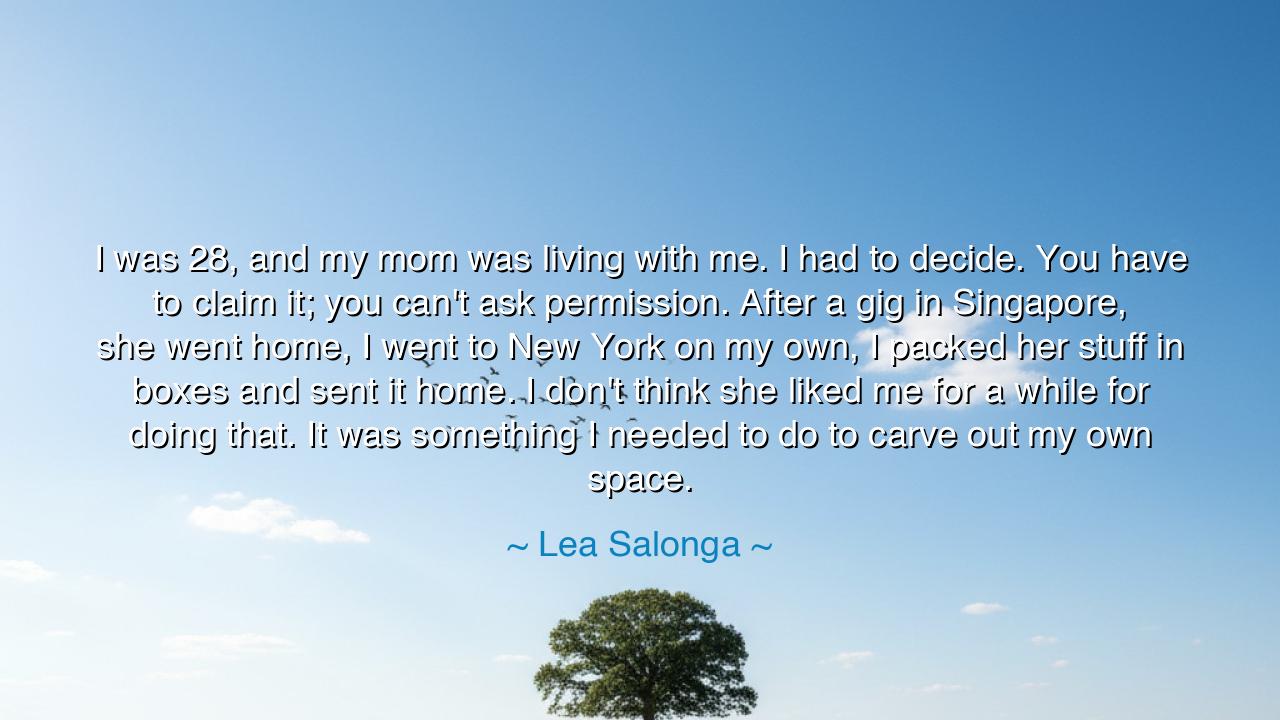
I was 28, and my mom was living with me. I had to decide. You
I was 28, and my mom was living with me. I had to decide. You have to claim it; you can't ask permission. After a gig in Singapore, she went home, I went to New York on my own, I packed her stuff in boxes and sent it home. I don't think she liked me for a while for doing that. It was something I needed to do to carve out my own space.






Hear now, O seekers of independence, the words of Lea Salonga, who spoke with honesty about a turning point in her life: “I was 28, and my mom was living with me. I had to decide. You have to claim it; you can’t ask permission. After a gig in Singapore, she went home, I went to New York on my own, I packed her stuff in boxes and sent it home. I don’t think she liked me for a while for doing that. It was something I needed to do to carve out my own space.” Though these words tell of a personal moment, they are filled with the universal struggle between love, dependence, and the call to stand alone.
First, let us reflect upon the age: 28. To the world, adulthood begins far earlier, but the heart often lingers under the shelter of parents. Even in success, even in recognition, there remains the shadow of childhood dependence. Salonga names the difficult truth: there comes a time when one must move from the comfort of family into the wilderness of selfhood. That step is not born of ingratitude, but of necessity.
Her phrase “you have to claim it; you can’t ask permission” carries the power of a battle cry. For independence is not given; it must be taken. No parent, however loving, can hand their child autonomy. It must be seized, sometimes in painful ways. Salonga did not wait for her mother’s blessing—she acted, because to wait would have been to remain bound. This is a lesson for all: to wait for permission to live one’s own life is to surrender it.
She tells of the act itself: after returning from Singapore, she went to New York, packed her mother’s belongings, and sent them home. This is not a gesture of cruelty, but of courage. To move a parent from one’s space is to break an ancient bond, to say, “I am now responsible for myself.” It brought pain—her mother “did not like her for a while”—but it also brought growth. The carving of her own space was not only physical but spiritual. In that act, she claimed her adulthood fully.
History has shown us this pattern. Consider Alexander the Great, who as a young man had to leave behind the shadow of his mother Olympias and his father Philip in order to carve his own empire. Their influence was strong, their presence commanding, but Alexander could not be Alexander until he stepped away and claimed the world as his own. In smaller ways, each of us faces this same moment: to depart from the shelter of those who raised us, not because we love them less, but because we must love our destiny more.
The meaning of Salonga’s words is thus twofold: first, they are a testament to the deep bonds of family, which can endure even conflict and disappointment. Second, they are a call to courage—to take the necessary steps to become fully oneself, even when those steps hurt. Her act was not rebellion but transformation, not rejection but growth. Independence often feels like betrayal, yet it is the only way to fulfill the purpose that lies within.
So let the lesson be this: love your parents, honor them, but do not remain forever under their shadow. When the time comes, claim your life. Do not wait for approval, for often those who love you will cling out of fear of losing you. Step forward with courage, even if it brings temporary pain. Take practical steps: set boundaries, create your own space, and accept that not all will understand. For in time, love will return, healed by respect, and your independence will stand as both a gift to yourself and a tribute to those who raised you.
Thus, as Lea Salonga teaches, the carving of one’s space is not an act of selfishness but of necessity. To claim freedom is to step into destiny. And though it may wound in the moment, it builds the foundation for a life that is fully, authentically, and courageously your own.






AAdministratorAdministrator
Welcome, honored guests. Please leave a comment, we will respond soon